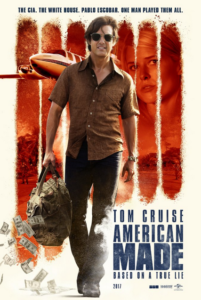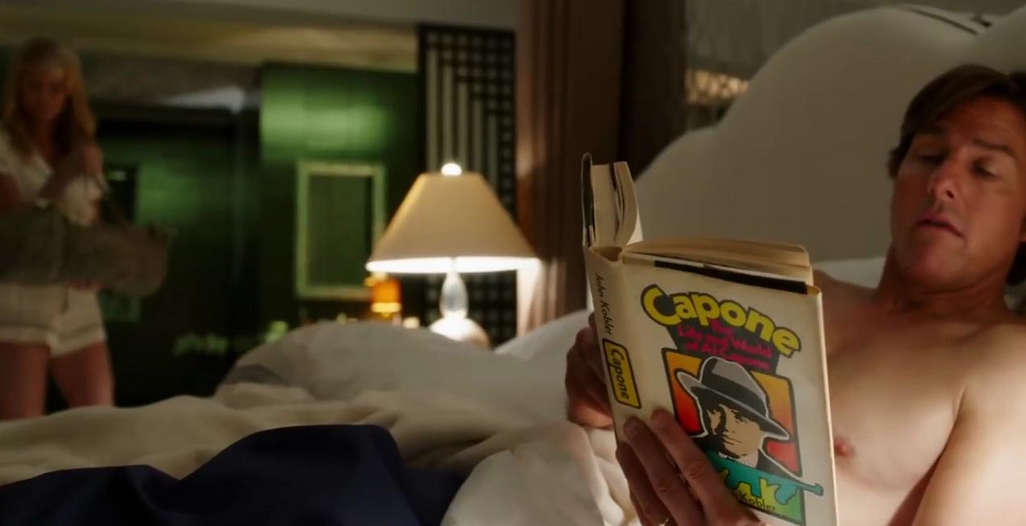
 “Just say no!” First Lady Nancy Reagan tells us at one point in “American Made.” It’s a famous archived video clip in which she and President Reagan share their plan to battle nationwide drug addiction. Unfortunately, the solution to the on-going drug problem wasn’t that simple.
“Just say no!” First Lady Nancy Reagan tells us at one point in “American Made.” It’s a famous archived video clip in which she and President Reagan share their plan to battle nationwide drug addiction. Unfortunately, the solution to the on-going drug problem wasn’t that simple.
In “American Made,” Tom Cruise plays 1980s drug smuggler Barry Seal, whose relationship with Pablo Escobar and the Medellin Cartel was exploited by various U.S. government agencies. And it wasn’t that Seal didn’t benefit from playing both sides. As this immensely entertaining picture vividly shows us, for a while, Seal was on top of the world, sometimes, quite literally.
Directed by Doug Liman, who always manages to make watchable familiar material, has worked with Cruise before. The two collaborated wonderfully on 2014’s “Edge of Tomorrow.” He has a distinct style marked by handheld camera and unceasing energy. “American Made” continues Liman’s pattern with loads of camera motion and an interesting digital film palette. It makes “Made” constantly engaging as the images are intimately captured. The narrative and visual style includes shots on what appears to be a 1980s video camera with Cruise as Seal talking directly to the viewer.
Cruise is really good here. Adopting a Southern accent, he melts into character convincingly. But there’s something always in play when he’s on screen—he’s incredibly likable. He gives Seal, a criminal, such a magnetic personality that’s matched with pragmatic smarts that one wonders how Seal ever got caught. But behind Cruise’s portrayal is a subtle sadness that gets ever darker as the wheels come off the dangerous drug smuggling operation.
The quick smile and familiar Cruise charm is obviously hiding something out of place with the character—Seal was more lucky than clever. I got it, because the weakness is there in this slick performance, you just have to look closely. In one scene, Seal hides in a bathroom while a co-worker peppers him with questions. Seal is dirty and visibly shaken by earlier events. The pilot persona that has carried Seal to the upper echelon of the illegal drug trade is beginning to fail him, as someone else has taken the captain’s seat.
As hip as Liman, Cruise and screenwriter Gary Spinelli make Seal’s short and fabulous, but ill-fated run, there is never a sense of ease, even as Seal activates auto-pilot on his high-tech plane while he smuggles drugs and guns. This is not a life to be emulated. Seal had a great job as a TWA pilot, a beautiful wife, and kids; drug smuggling was completely unnecessary, but as this film tells it, the U.S. government was complicit in his rise. There’s just no way around it, the corrupting influences of the elicit drug business are so tempting that some of the most talented and intelligent among us get caught in its gravitational pull. And government officials had to be see it coming and recklessly disregarded the inevitable slide into darkness.
As the story unfolds, Liman smartly gives us a 1980s history lesson with Seal as the narrator. Using colorful and humorous animations with archived news footage, the tricky relationship the Reagan administration had with Central American nations gets a Cliff’s Notes synopsis. And it’s undeniable fun to trip back through the events that, as a child of 1980s, shaped my political maturation. While clearly told from Seal’s rationalized slant, his perspective isn’t without basic elements of truth. Alliances and deals were cut that often had the effect of increasing the flow of drugs into the US. Such is the complicated nature of foreign policy.
One wonders whether Cruise’s infectious personality is true to Seal’s real life persona. But the film does play as a tragic cautionary tale as expert pilot Seal flies too close to the sun.

